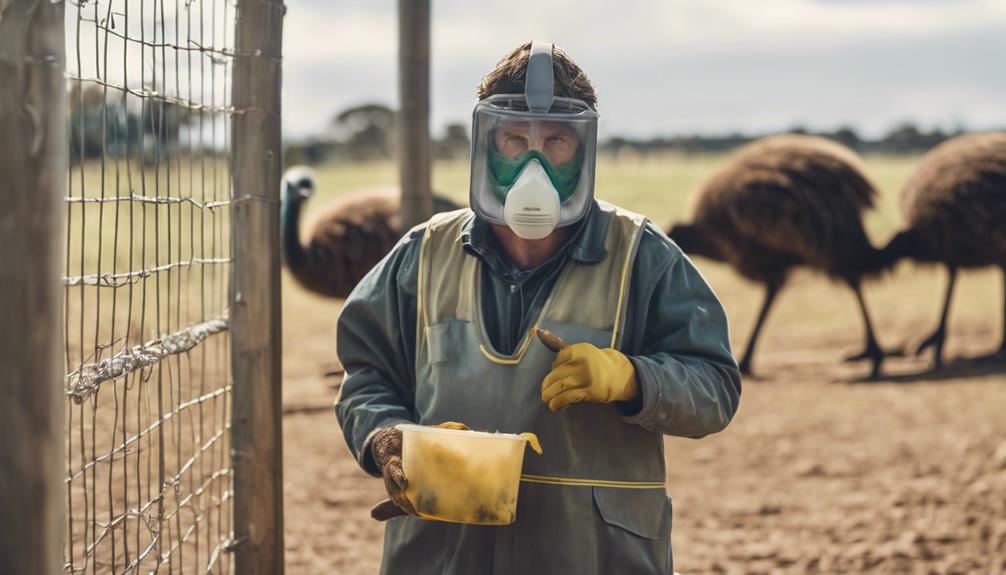
When it comes to managing an emu farm, safety protocols are not just a formality but a necessity. Ensuring the well-being of your emus and farm personnel requires a meticulous approach to every aspect of farm operations. From layout planning to emergency response, each step plays a crucial role in maintaining a secure environment. But what about the unexpected factors that can challenge even the most rigorous safety measures?
Key Takeaways
- Implement strict hygiene protocols to prevent disease transmission.
- Ensure sturdy fencing at least 6 feet high for security.
- Train handlers on safe emu handling techniques.
- Establish clear Emergency Response Procedures and conduct regular drills.
- Regularly inspect and maintain farm infrastructure and equipment.
Farm Layout Planning

When planning the layout of your emu farm, ensure that pathways are wide enough to allow for easy movement of animals and equipment. Adequate spacing between enclosures is crucial for preventing overcrowding and ensuring that emus have enough room to roam freely. Keep in mind the size and behavior of emus when designing the layout to minimize stress and potential conflicts between birds. Additionally, consider the positioning of feeding and watering stations to provide easy access for both the emus and farm personnel.
To optimize workflow efficiency, strategically place storage areas for feed, tools, and medical supplies in convenient locations throughout the farm. This will help streamline daily operations and minimize the time spent transporting materials back and forth. Implement clear signage along pathways and at key locations to ensure that everyone on the farm can easily navigate the premises and locate essential facilities.
Secure Fencing Installation
To ensure the safety and containment of your emus, it's crucial to install sturdy and secure fencing around their enclosures. Emus are strong and curious birds that can easily jump over or break through inadequate fencing. When installing fencing for your emu farm, opt for materials like high-tensile wire or chain link that are difficult for emus to damage. Ensure that the fencing is at least 6 feet high to prevent the emus from jumping over it.
Additionally, bury the bottom of the fence at least 12 inches into the ground to deter digging. Regularly inspect the fencing for any signs of wear or damage, repairing them promptly to maintain the security of the enclosure. Implementing electric fencing can also act as a deterrent for emus testing the boundaries.
Handling Emus Safely
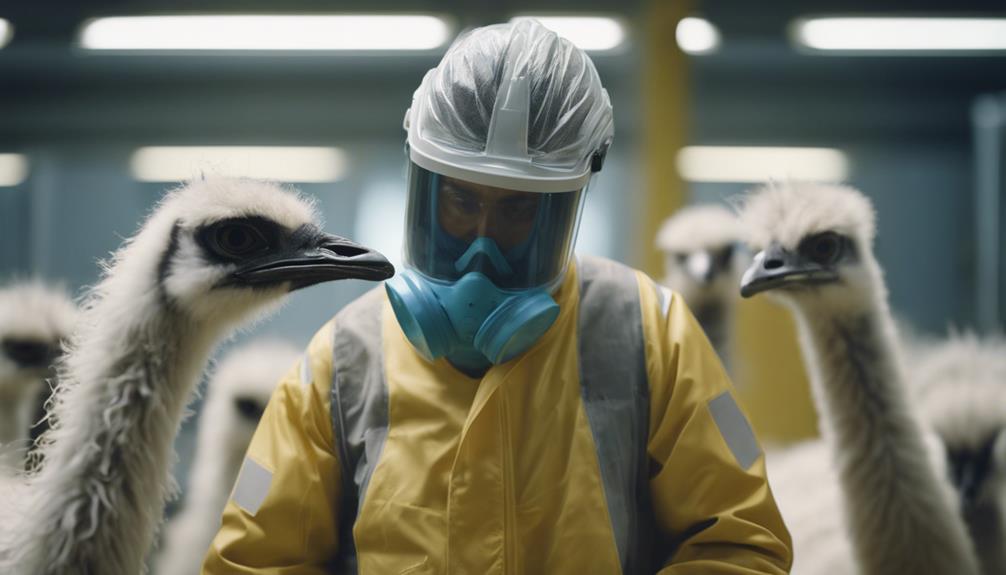
Ensuring the safe handling of emus on your farm involves implementing proper techniques and precautions to minimize risk and maintain a secure environment for both the birds and handlers. When handling emus, always approach them calmly and confidently. Emus are naturally curious but can become defensive if they feel threatened. Maintain a firm grip on the bird's neck when handling to prevent sudden movements that could startle or harm them. It's crucial to avoid loud noises or sudden gestures that may agitate the emus.
When moving emus from one location to another, use secure and sturdy handling equipment designed specifically for birds of their size. Ensure that the equipment is in good condition and can safely contain the emus without causing injury. Always have a clear plan in place before attempting to handle emus, including designated routes and emergency procedures. Regular training for handlers on proper emu handling techniques is essential to prevent accidents and ensure the well-being of both the birds and the handlers. Remember, proper handling techniques are key to maintaining a safe and efficient emu farming operation.
Emergency Response Procedures
Maintain readiness for unexpected situations by establishing clear and practiced Emergency Response Procedures on your emu farm. In the event of an emergency, swift and decisive action is crucial to ensure the safety of both personnel and emus. First and foremost, designate specific individuals to be in charge of coordinating the emergency response. These individuals should be well-trained and familiar with the procedures outlined in the farm's emergency response plan.
Establish communication protocols to quickly alert all staff members in case of an emergency. This may include alarm systems, two-way radios, or designated meeting points. Ensure that all employees are aware of these protocols and conduct regular drills to practice response times and efficiency.
Additionally, equip designated personnel with necessary emergency supplies such as first aid kits, fire extinguishers, and emergency contact information. Regularly inspect and maintain these supplies to guarantee their functionality when needed. By implementing these Emergency Response Procedures, you demonstrate a commitment to preparedness and the safety of your emu farm operations.
Health and Hygiene Practices

Implementing robust health and hygiene practices is essential for ensuring the well-being of both your personnel and emus on the farm. To maintain a safe and healthy environment, all staff members must adhere to strict hygiene protocols. This includes washing hands thoroughly before and after handling emus, wearing appropriate personal protective equipment such as gloves and masks, and ensuring that all equipment is sanitized regularly.
Regular health check-ups for both employees and emus are crucial to prevent the spread of diseases. Any signs of illness should be reported immediately to the farm manager to prevent potential outbreaks. It's also important to maintain a clean living environment for the emus by regularly cleaning and disinfecting their living quarters.
Proper waste disposal is another key aspect of maintaining good health and hygiene practices on the farm. Waste should be disposed of in designated areas away from the living quarters to prevent contamination. By prioritizing health and hygiene practices, you aren't only protecting the well-being of your personnel but also ensuring the health and safety of your emus.
Equipment Maintenance Guidelines
To uphold a high standard of safety and functionality on your emu farm, meticulous attention to equipment maintenance is paramount. Regularly inspect all machinery and tools used on the farm to ensure they're in optimal working condition. Check for any signs of wear and tear, such as frayed wires, loose bolts, or rust, and address these issues immediately to prevent accidents.
Create a maintenance schedule outlining specific tasks and intervals for servicing each piece of equipment. Keep detailed records of maintenance activities, including dates of inspections, repairs made, and parts replaced. This won't only help track the condition of your equipment but also aid in identifying any recurring issues that may require attention.
Invest in high-quality lubricants and cleaning agents to keep your equipment running smoothly. Properly store tools in designated areas to prevent damage and misplacement. Train your farm workers on the importance of equipment maintenance and encourage them to report any malfunctions promptly.
Training for Farm Workers
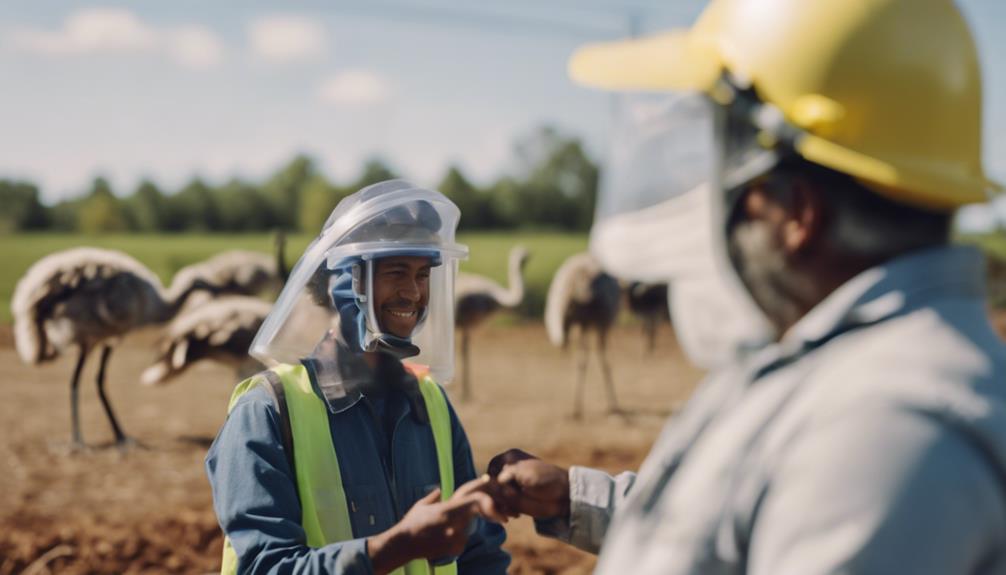
Inspecting equipment regularly is essential for farm safety. Now we'll focus on providing comprehensive training for your farm workers. Proper training ensures that your workers are equipped with the knowledge and skills needed to handle tasks safely and efficiently.
Here are some key elements to include in your farm worker training program:
- Safety Procedures: Train your workers on the correct procedures for handling emus, operating machinery, and handling potentially hazardous materials.
- Emergency Response: Educate your workers on the appropriate actions to take in case of emergencies such as fires, injuries, or animal escapes.
- Equipment Usage: Provide thorough training on the proper operation and maintenance of farm equipment to prevent accidents and ensure longevity.
Disease Prevention Protocols
Ensuring strict adherence to disease prevention protocols on your emu farm is paramount to safeguarding the health and well-being of your valuable birds. Implement a robust biosecurity plan to minimize the risk of diseases spreading among your emus. Start by limiting access to your farm and establishing designated entry points. Require all visitors and staff to wear appropriate protective gear, such as disposable coveralls and boots, before entering the premises.
Regularly disinfect all equipment, vehicles, and tools used on the farm to prevent the transmission of pathogens. Quarantine new birds before introducing them to the existing flock to monitor their health status and prevent potential disease outbreaks. Implement a vaccination schedule recommended by a veterinarian to protect your emus from common illnesses.
Monitor your birds daily for any signs of illness, such as changes in behavior, decreased appetite, or unusual droppings. Immediately isolate sick emus to prevent the spread of diseases within the flock. By diligently following these disease prevention protocols, you can maintain a healthy and thriving emu farm.
Weather Preparedness Measures
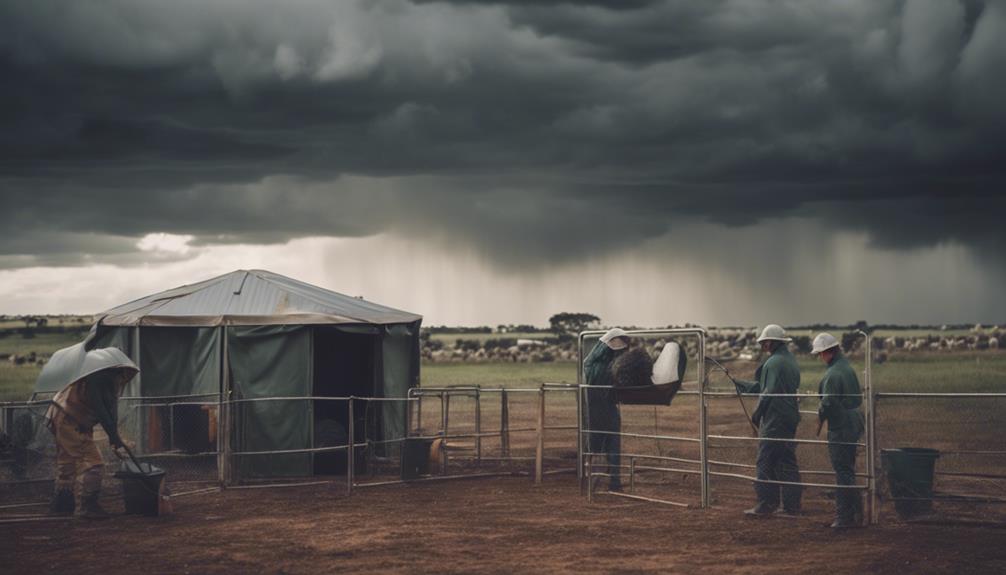
Implementing proper shelter and reinforcement measures is crucial to safeguard your emus during unpredictable weather conditions on your farm. Emus are resilient birds, but they still need protection from extreme weather to thrive. Here are key weather preparedness measures to ensure the safety of your emus:
- Sturdy Shelters: Construct sturdy shelters that can withstand strong winds and heavy rains. Ensure they have proper ventilation to prevent moisture buildup.
- Secure Fencing: Reinforce fencing around the emu enclosures to prevent damage from storms or high winds. Regularly inspect and repair any weak spots.
- Emergency Supplies: Stock up on emergency supplies such as extra feed, water, and medical supplies in case of severe weather disruptions. Have a backup power source for essential equipment like heaters.
Visitor Safety Guidelines
When hosting visitors at your emu farm, prioritize their safety by adhering to strict guidelines and protocols. Ensure that all visitors are provided with clear instructions on how to safely interact with the emus. Emphasize the importance of maintaining a safe distance from the birds, especially during feeding times or when entering their enclosures. Encourage visitors to move slowly and avoid sudden movements that may startle the emus. Make sure that all pathways and viewing areas are well-maintained and free of any obstacles that could pose a tripping hazard.
It is crucial to have trained staff or guides present to supervise visitors and answer any questions regarding safety procedures. Provide appropriate safety gear such as sturdy footwear and hand sanitizer to guests before they enter the farm premises. Display prominent signage outlining safety rules and emergency contact information throughout the farm. Regularly review and update your visitor safety guidelines to reflect any changes in farm operations or potential hazards.
Record-Keeping Requirements
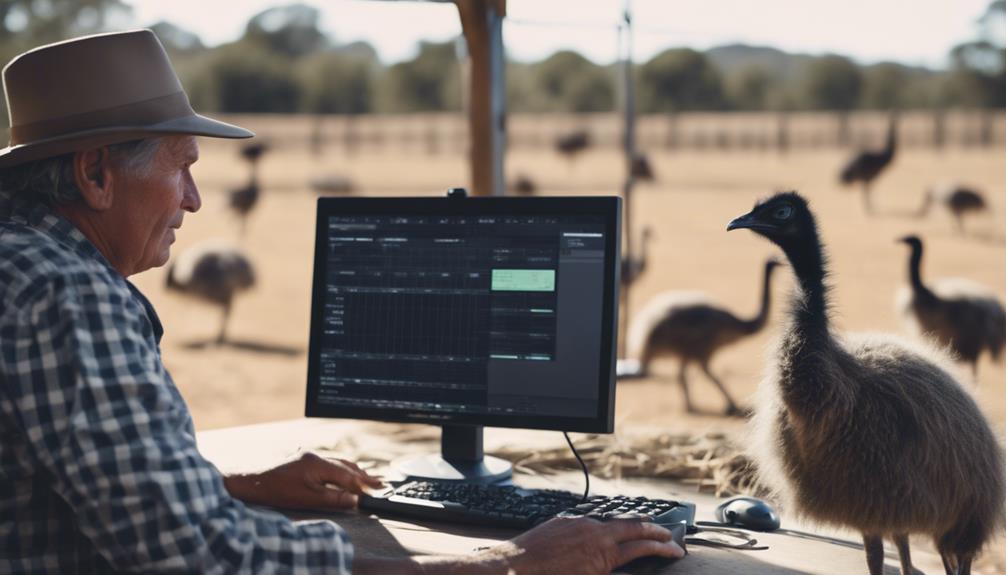
Maintain detailed records of all interactions and activities involving visitors at your emu farm to ensure accountability and traceability. Keeping meticulous records is crucial for the safety and security of your farm.
Here's how you can ensure you're meeting the record-keeping requirements:
- Visitor Logbook: Require all visitors to sign in upon arrival, noting their contact information, purpose of visit, and any specific areas they'll be accessing.
- Activity Documentation: Record any activities or events that visitors participate in during their time at the farm, including guided tours, feeding sessions, or educational workshops.
- Emergency Contact Information: Keep a comprehensive list of emergency contact numbers for visitors in case of any unforeseen incidents or accidents.
Regular Farm Inspections
To ensure the safety and well-being of both your emus and visitors, conduct regular inspections of your farm premises.
Regular farm inspections are crucial in maintaining a safe environment for your emus to thrive and for visitors to feel secure during their time at your farm. Start by inspecting fences and enclosures to ensure they're intact and secure, minimizing the risk of escapes or unauthorized access. Check for any sharp edges or potential hazards that could harm your emus or visitors.
Inspect water sources to guarantee they're clean, easily accessible, and in good working condition. Regularly assess feeding areas to prevent contamination and ensure proper nutrition for your emus.
Additionally, inspect walkways and visitor areas to remove any obstacles or potential tripping hazards. By conducting thorough and consistent farm inspections, you demonstrate your commitment to safety and uphold a standard of excellence in emu farm management.
Frequently Asked Questions
What Should I Do if an Emu Escapes From the Farm?
If an emu escapes from the farm, stay calm and avoid sudden movements. Slowly create distance and ensure others do the same. Notify farm staff immediately to handle the situation safely and prevent any potential risks.
Are There Any Specific Feeding Requirements for Emus?
When feeding emus, remember to provide a balanced diet including grains, fruits, and vegetables. Ensure access to fresh water at all times. Monitor their intake to prevent overfeeding. Consult with a vet or specialist for specific dietary requirements.
How Do I Identify Signs of Stress or Illness in Emus?
To identify signs of stress or illness in emus, observe for abnormal behaviors like lethargy, excessive pecking, or changes in eating habits. Monitor their droppings for consistency and color changes. Promptly consult a vet for professional assessment and treatment.
Can Emus Coexist With Other Livestock on the Farm?
Yes, emus can coexist with other livestock on the farm. Ensure proper fencing to prevent conflicts and provide separate feeding areas. Monitor interactions closely to address any aggression. Consult with a veterinarian to create a harmonious environment.
What Measures Are in Place to Prevent Emu-Related Accidents on the Farm?
To prevent emu-related accidents on the farm, you meticulously plan and enforce safety measures. Vigilantly inspect enclosures, maintain fences regularly, and provide proper training to staff. Remember, an ounce of prevention is worth a pound of cure.
Conclusion
Now that you have implemented these emu farm safety protocols, you can rest assured knowing that you have taken the necessary steps to protect both your emus and yourself.
By prioritizing farm layout planning, secure fencing installation, safe handling techniques, emergency response procedures, health practices, weather preparedness, visitor safety guidelines, record-keeping, and regular inspections, you have created a safe environment for everyone involved.
Remember, safety is key in maintaining a successful and thriving emu farming operation.




